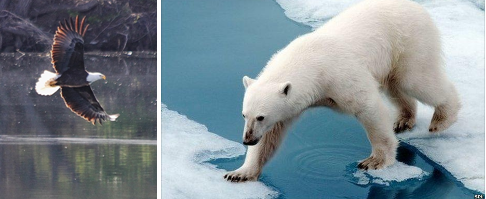 By Miriam Raftery
By Miriam Raftery
Photo: Bald eagles have been saved from the brink of extinction by the Endangered Species Act; polar bears are among species now considered vulnerable.
August 17, 2019 (Washington D.C.) – Just two weeks ago, the United Nations and International Union for Conservation of Nature published two reports warning that climate change is pushing a million species closer to extinction. Yet last week, the Trump administration announced plans to take effect in September that dramatically weaken protections for endangered and threatened species.
The plan announced by the U.S. Fish and Wildlife Service and the National Oceanic and Atmospheric Administration puts at-risk species in greater peril through three changes:
- Allow the government to consider economic factors before categorizing a species as endangered or threatened;
- Change protections for threatened species, such as polar bears, to be decided on a case by case basis, not mandated;
- Define risks to species in the foreseeable future on a case by case basis based on a loose definition that could exclude consideration of climate change impacts.
The Endangered Species Act was signed into law by Republican President Richard Nixon in 1973 and is credited with saving many animals and plants from vanishing forever. Over 1,600 species are currently protected by the act, including extremely rare species in the U.S. such as jaguars, ocelots and California condors.
U.S. Secretary of the Interior David Bernhardt defends the slashing of protections, stating, “The act’s effectiveness rests on clear, consistent and efficient implementation.”
But critics say allowing economics to take priority over biology could amount to a sell-out to industries such as logging, oil, mining, ranchers and developers, putting profits over preservation. Indeed, the government has received statements in support of the changes from the head of the National Association of Home Builders, the Western Energy Alliance, the Cattleman’s Association and other special interests.
The Trump administration has stacked environmental agencies with directors with a history of working for or supporting industries and hostile toward federal environmental laws.
Lena Moffitt, a senior director at the Sierra Club, says the Endangered Species Act is the most effective and essential law to protecting wildlife. “Without it, iconic American species like the bald eagle, California condor, gray wolf and humpback whale could be lost forever,” she notes, adding that over 99 percent of the species protected by the Act have avoided extinction. “For some species, it is their only chance at survival,” she says. “We can’t let the federal government abandon this responsibility for politics and profit.”
A petition urging Congress to reverse the rollback of Endangered Species Act protections has been set up; click here to view or sign.
The San Diego Zoo has also weighed in against the rule changes.
"We are concerned that the changes to the Endangered Species Act will make it more difficult for us to protect species across the world for future generations," the San Diego Zoo tweeted. "We have a rich diversity of unique species, many of whom find refuge in San Diego county. The proposed changes will reduce the protections that these species currently have, & limit the ability of wildlife officials to protect their homes & provide for long-term recovery."
Massachusetts has filed a lawsuit seeking to stop the new rules from being implemented – a suit that California could join.
California Attorney General Xavier Becerra issued a statement condemning the changes.
“As we face the unprecedented threat of a climate emergency, now is the time to strengthen our planet’s biodiversity, not to destroy it,” Becerra states. “Our precious wildlife and ecosystems are in critical danger. By rolling back the Endangered Species Act the Trump Administration would be putting a nail in our coffin – all for the sake of boosting the profits of those putting these species at risk in the first place.”
He concludes, “We’re ready to fight to preserve this important law – the species with whom we share this planet, and depend on, deserve no less.”







Recent comments